

Bangladesh’s January 7 elections are headed for a predictable outcome because the main opposition Bangladesh Nationalist Party ( BNP) has refused to participate. Its longtime ally, the pro-Pakistan Jamaat-e-Islami, has failed to regain registration as a legitimate political party after its appeal was defeated in court by rights activist Tania Amir representing the moderate Tarikat Foundation. But uncertainties abound in the post-election scenario, some of it less than savoury for India.
Fearing the adverse global impact of another opposition-less election and in a vain attempt to deflect Western pressure over “murder of democracy” charges, PM Sheikh Hasina decided to allow Awami League dissidents, who missed out on official party nomination, to contest as ‘independents’. But the veneer of competition was washed away when the Awami League agreed not to field candidates in 26 seats against the Jatiya Party (JP) and against its leftist allies in another seven seats.
An assessment by intelligence agencies points to a cakewalk for Awami League candidates in 174 seats in the 300-member House, in 76 of which there are no ‘independents’ either. This brings back the spectre of the controversial 2014 polls when 153 Awami League were elected unopposed. The 2018-19 polls were not much different after the BNP pulled out halfway alleging electoral fraud. But the agencies predict a stiff fight in 110 seats between official Awami League candidates and its independents.
JP and Left candidates are likely to lose quite a few of their seats because they face formidable Awami League independents such as the several-times MP Mir Mostaque Ahmed Robi, a 1971 naval commando who did not get an official nomination on the bidding of a powerful Islamist lobby within Awami League led by Hasina’s all-powerful adviser Salman F Rahman. This is despite Rahman’s company Beximco figuring at the top of the charts in bank defaults.
Unlike Robi, most Awami League candidates seem to have managed JP and other smaller-party candidates such as Asadul Islam Tito with money power. Tito’s name figured prominently in stock market scams. His seat was denied to heavyweight leader Tarana Halim despite her huge popularity. Like Robi, Rahman targeted her because of her strong anti-fundamentalist politics—her slogan is “Amar mati, amar ma, Pakistan hobe na (My land, my mother, won’t become Pakistan).”
Halim is the founder chairperson of the party’s cultural front and her refusal to clear Beximco’s shady proposals during her 2015-16 tenure as telecom minister has made her a long-term target for Rahman, who has reportedly managed to secure nearly 100 nominations for his camp followers—either with strong fundamentalist background or from the emerging pro-China trader lobby. Many feel this is his first big step towards a senior position in a future Hasina Cabinet.
Rahman’s trump card is his son Shayon’s business partnership with Hasina’s son Sajeeb Wajed Joy, who is now under US government scanner over the purchase of multiple properties that are disproportionate to Joy’s known sources of income in Bangladesh and the US.
It is a precarious dilemma for India because it has to back a changed Awami League where pro-Indian secularist elements have been systematically marginalised by the Rahman-led Islamist lobby. China’s influence has grown, too, after traders with strong Chinese links got more nominations.
With India engaged in a tussle with its strategic partner US, which wants Hasina’s ouster, its influence over Hasina is at an all-time low. Delhi has only itself to blame, having missed out on an opportunity to create a pro-liberation platform during the Shahbagh agitations, which could have been converted into a party that would give India a viable alternative to Awami League without having to repeat the disastrous 2001 backing of the BNP-Jamaat coalition.
India is now having to back an increasingly autocratic regime with little democratic credentials that gets it into a tussle with the West. This comes after Hasina showed clear indications that she fancied the Chinese one-party model over the Indian multi-party democracy. The Chinese model draws strength from economic growth and passing down of prosperity which Bangladesh initially followed during former Finance Minister A M A Muhith’s tenure, but under Rahman’s influence has slid towards kleptocracy.
We may see a repeat of Sri Lanka, Maldives and Nepal—except that in Bangladesh, the party in power may continue to be identified as pro-Indian for historical reasons. India also has to weigh in for other possible less-than-welcome scenarios like opposition violence, destabilising US moves like sanctions, visa restrictions or attempts to cut down the Bangladesh army’s participation in UN peacekeeping.
The army battalions that are to be deployed on poll duty on January 3 are mostly commanded by officers recruited during the 2001-06 BNP-Jamaat era. The fallout of all this on the country’s economy will surely worry India.
Subir Bhaumik, Senior journalist, Queen Elizabeth fellow at Oxford University, author most recently of Agartala Doctrine
(Views are personal)